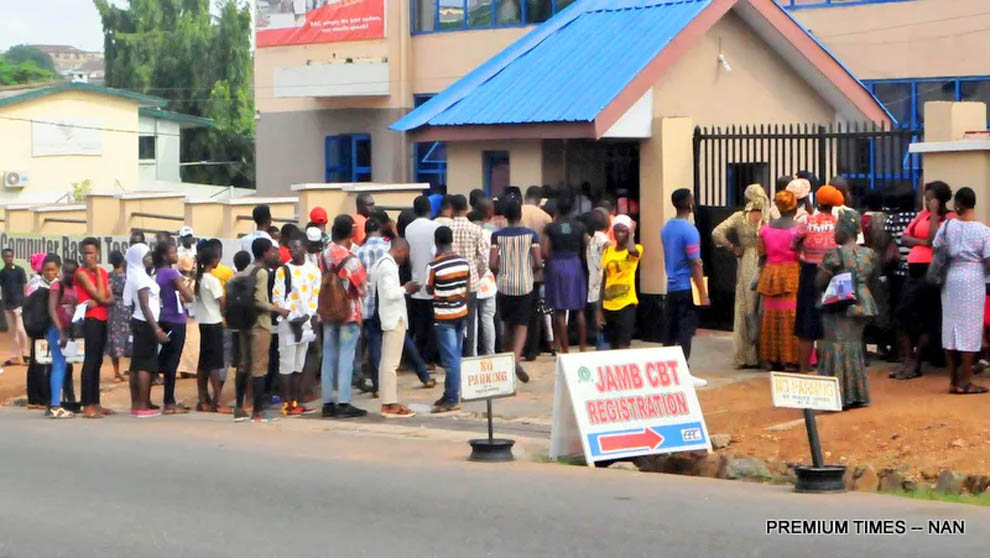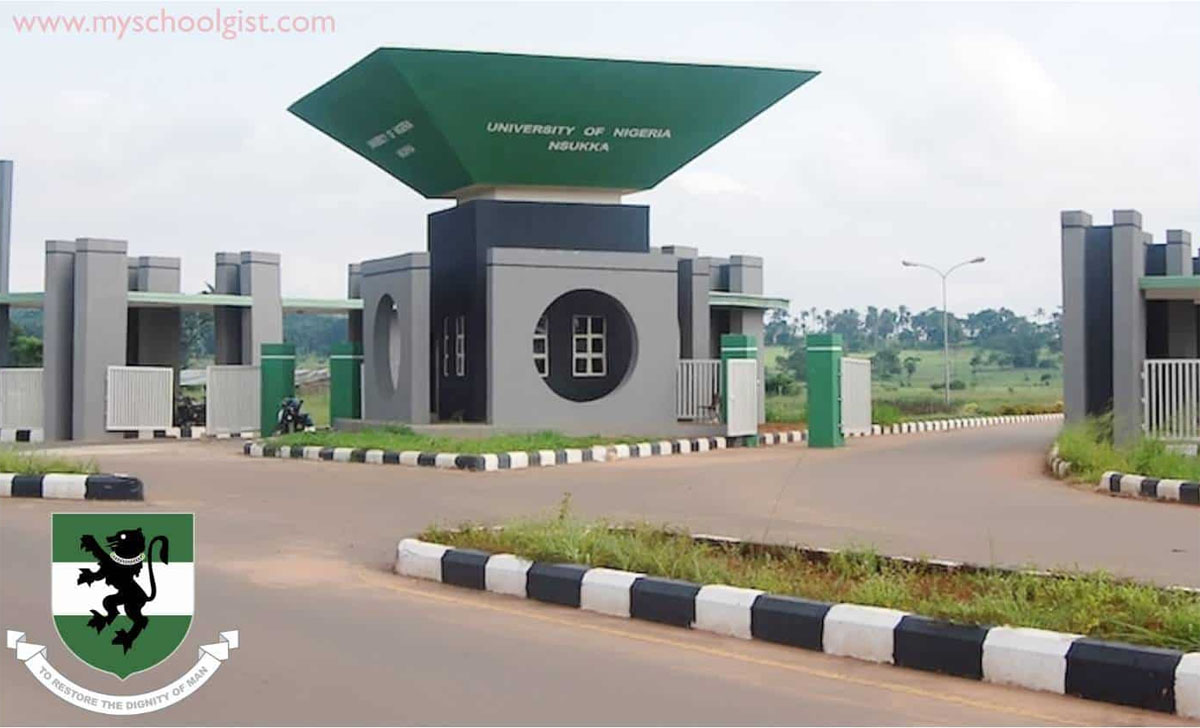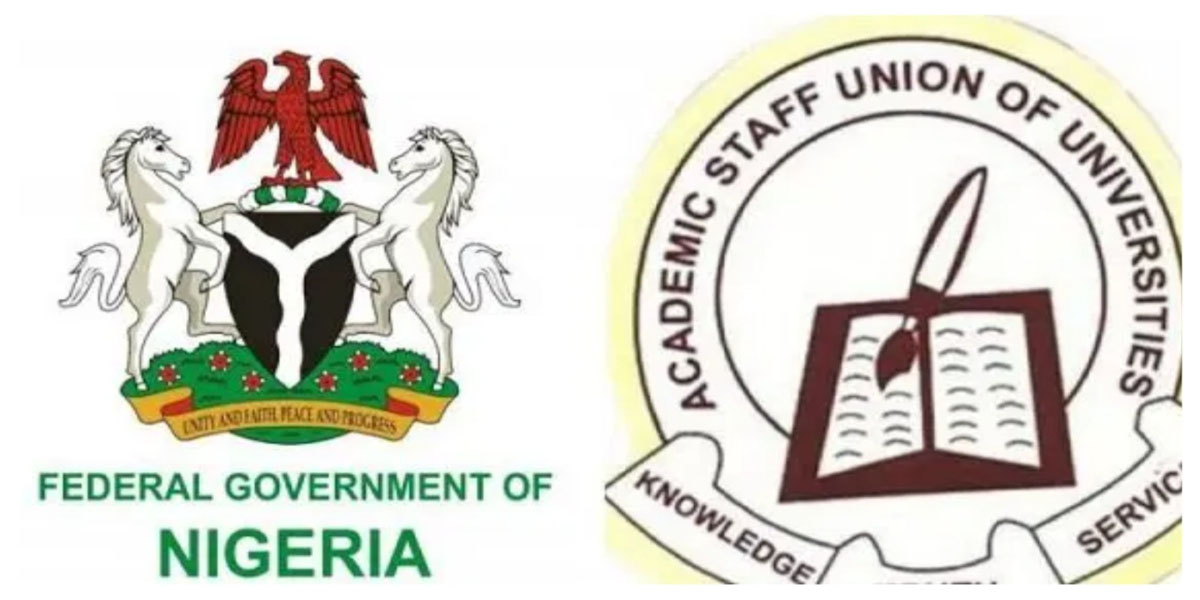Education
Illegal admissions: Students flock JAMB offices ahead of Aug 31 deadline

Illegal admissions: Students flock JAMB offices ahead of Aug 31 deadline
Students of tertiary institutions are rushing to Joint Admissions and Matriculation Board’s offices nationwide in an attempt to verify their school admission status.
This is coming ahead of the August 31, 2024 deadline given higher institutions to disclose candidates admitted outside the JAMB’s Central Admissions Processing System (CAPS),
Newstrends reports that JAMB recently issued a directive to all universities, polytechnics, and colleges of education to submit lists of students admitted through non-CAPS channels from 2017 to the present time.
The directive aims to ensure compliance with the established admission processes.
However, in a statement released on Thursday, JAMB’s Public Communication Advisor, Dr. Fabian Benjamin, highlighted the significant number of students visiting JAMB offices in response to this directive.
READ ALSO:
- Customs seize N1.8bn pharmaceutical items at Apapa port
- Bandits abduct police officer in Plateau
- Peter Obi knocks Tinubu administration over seized presidential jets
He clarified that the responsibility for compliance lies squarely with the institutions, not the candidates.
“The Joint Admissions and Matriculation Board (JAMB) has observed a large influx of candidates to its offices concerning the disclosure of admissions made outside the Central Admissions Processing System (CAPS) from 2017 to date,” the statement read.
“While we appreciate the concern of these candidates, it is important to clarify that the focus of the directive is on the institutions involved, which must disclose all such admissions by the August 31st, 2024 deadline.”
Dr. Benjamin emphasized the urgency of the situation, urging institutions to thoroughly review JAMB’s initial directive and ensure full compliance. “Failure to disclose will result in severe consequences,” he warned.
“Candidates are also reminded that accepting admissions outside CAPS is prohibited,” the statement said.
The exam body warned that it will not entertain any undisclosed admissions and will no longer tolerate any violations of its processes moving forward.
Illegal admissions: Students flock JAMB offices ahead of Aug 31 deadline
Education
UNN Students Reject 100% Fee Hike, Insist on Maximum 25% Increase

UNN Students Reject 100% Fee Hike, Insist on Maximum 25% Increase
Students of the University of Nigeria, Nsukka (UNN) have rejected the management’s proposal to increase school fees by 100 percent, insisting that any adjustment should not exceed 25 percent.
In a memo dated 28th December 2025, the Executive Council of the Students Union Government (SUG) addressed the student community on the matter. Signed by SUG President Comrade Chinedu Ozoagu, the memo, titled “School Fees Increment Alert for the 2025/26 Academic Session,” revealed that the university management had held an emergency meeting with the union leadership to discuss student welfare issues.
“During the meeting, the management proposed a 100% increase in school fees to take effect from the 2025/26 academic session citing funding challenges,” the memo stated. However, after consultations with students across UNN and UNEC campuses, the SUG rejected the 100% hike, proposing a maximum of 25% increase considering the current economic realities.
READ ALSO:
- Police Arrest 22-Year-Old Over Alleged Rape of Minor in Oyo State
- Army Rescues Over 1,000 Kidnap Victims, Destroys Bandit Camps Across North-West
- AFCON 2025: Oliseh Praises Osimhen’s Captaincy as Super Eagles Beat Uganda
The students also opposed any increase in hostel fees without commensurate improvements in living conditions. The SUG urged management to suspend hostel fee hikes until the conditions of the facilities improve, assuring students that dialogue with management continues to safeguard their interests.
Investigations by THE WHISTLER show that school fees at UNN vary by faculty, ranging from N90,000 to N200,000, while hostel fees range from N25,000 to N100,000. Some students highlighted the poor state of hostels. Paulinus Ossai said, “Most of the hostels are not habitable. Management wants to generate IGR from exploiting students. Hostels funded by Tetfund and rehabilitated attract N35,000, while old ones are N25,000 and in bad shape.”
Another student, Sabinus Ugwu, added, “The management should focus on improving the overall condition of the university. For almost four months now, there is no running water on campus, and power supply is epileptic. Imposing more fees is unfair.”
A university management source, speaking anonymously, defended the proposed hike, stating, “UNN is among the cheapest federal universities in Nigeria. With universities moving towards financial autonomy, it is no longer sustainable to provide top-quality education at heavily subsidised rates.”
UNN Students Reject 100% Fee Hike, Insist on Maximum 25% Increase
Education
ASUU, FG Reach New Agreement, Approve 40% Salary Increase from 2026

ASUU, FG Reach New Agreement, Approve 40% Salary Increase from 2026
The Academic Staff Union of Universities (ASUU) and the Federal Government of Nigeria have concluded negotiations on the renegotiation of the 2009 ASUU–FG agreement, with the new deal scheduled to take effect from January 1, 2026.
ASUU disclosed this in a statement published on its official Facebook page on Wednesday, announcing that the agreement was finalised on December 23, 2025, after prolonged negotiations. According to the union, the agreement will be reviewed every three years.
The renegotiated agreement places strong emphasis on improved welfare for university lecturers and enhanced funding for public universities. Key provisions include a 40 per cent salary increase for academic staff and significantly improved pension benefits.
READ ALSO:
- Brain Drain Deepens as 16,156 Nigerian Nurses Secure UK Licences Since 2017
- Sheikh Gumi Drags Two to Court Over Alleged Fake Threat Against Defence Minister
- Lagos Fire Service Battles Blaze at 25-Storey Great Nigeria Insurance House
Under the new terms, professors will earn pensions equivalent to their annual salary upon retirement at the age of 70, a move ASUU described as a major boost to post-service welfare in the university system.
The agreement also introduces a new funding framework for public universities, with dedicated allocations for research, libraries, laboratories, equipment, and staff development. A National Research Council is to be established to drive research and innovation, with funding pegged at a minimum of one per cent of Nigeria’s Gross Domestic Product (GDP).
Other provisions include strengthened university autonomy and academic freedom, the election of academic leaders such as deans and provosts restricted to professors, and assurances that no academic staff will be victimised for participating in past industrial actions.
ASUU urged the Federal Government to ensure the prompt and faithful implementation of the agreement, while also calling for the extension of similar negotiations to other university-based unions in order to promote lasting stability in Nigeria’s university system.
ASUU, FG Reach New Agreement, Approve 40% Salary Increase from 2026
Education
NOUN Student Dies After Collapsing During Examination at Victoria Island Centre

NOUN Student Dies After Collapsing During Examination at Victoria Island Centre
A student of the National Open University of Nigeria (NOUN), Michael Coker, has reportedly died after collapsing during an examination at the institution’s Victoria Island study centre in Lagos.
The tragic incident occurred around 11 a.m. on Tuesday, December 16, while students were preparing to sit for an examination. Witnesses said Coker suddenly collapsed inside the examination hall and allegedly lay unattended for several minutes while gasping for breath.
A fellow student, identified as Bukola, alleged that a female senior lecturer and invigilator prevented students from assisting the distressed student.
“It happened shortly after we entered the hall. Coker was standing when he suddenly collapsed. Another student held him and laid him on the floor,” Bukola said.
She claimed that the invigilator from a nearby hall ordered students to return to their seats instead of attending to the collapsed student.
“She kept chasing everyone away to continue writing the exam, even though he was on the floor gasping. When told a student had collapsed, she said in Yoruba, ‘E fi sílẹ̀, ó máa dìde’ (Leave him; he will get up),” Bukola alleged.
READ ALSO:
- Ojuelegba Bridge Gridlock as Container Truck Overturns in Surulere, Lagos
- Troops Foil Kidnapping on Otukpo–Enugu Expressway, Rescue Passengers in Benue
- Davido Joins Accord Party, Aligns With Uncle, Osun Governor Ademola Adeleke
According to her, Coker reportedly remained on the floor for over 15 minutes, during which students expressed concern and attempted to understand his condition, but were repeatedly stopped.
“It took several minutes before help came. Even moving him to a chair took another five minutes. By then, his breathing was very bad,” she said.
Bukola added that a nurse later arrived, administered first aid, and Coker was taken downstairs via an elevator. Students were reportedly instructed to continue with their examination and were only informed after the exam that Coker had died.
Another student and class representative, Prince Preskit, confirmed that Coker collapsed while attempting to log into the examination system.
“I think the invigilator initially wanted people to give him space. When it became obvious that it was serious, he was taken downstairs and rushed to the hospital,” Preskit said.
He disclosed that Coker was taken to Bonny Camp Hospital, but later died while being moved to another medical facility.
However, Bonny Camp Hospital denied claims that it rejected the student.
“The patient was not rejected,” a hospital official told Punch. “He was referred to another hospital where oxygen would be available.”
The incident has since sparked outrage among students, with many calling for a thorough investigation into the handling of the emergency during the examination.
NOUN Student Dies After Collapsing During Examination at Victoria Island Centre
-

 metro2 days ago
metro2 days agoNiger Delta Crackdown: Army Seizes ₦150m Stolen Oil, Arrests 19 Suspects
-

 Sports3 days ago
Sports3 days agoCristiano Ronaldo Wins Best Middle East Player at 2025 Globe Soccer Awards in Dubai
-

 Sports3 days ago
Sports3 days agoAnthony Joshua injured as two die in fatal Lagos-Ibadan Expressway crash (plus photos)
-

 metro1 day ago
metro1 day agoMrs. Regina Akume Urges SGF George Akume to Return to Christianity Amid New Marriage
-

 metro2 days ago
metro2 days agoTwo Close Aides of Anthony Joshua Identified as Victims of Fatal Crash
-

 metro2 days ago
metro2 days agoOgun Man Arrested After ₦4,000 Debt Dispute Claims Stepbrother’s Life
-

 metro1 day ago
metro1 day agoMalami, Son, Wife Remanded Over ₦Billions Money Laundering Charges
-

 metro2 days ago
metro2 days agoTinubu Condoles Anthony Joshua After Ogun Crash That Killed Two Associates









